Security for future-oriented infrastructures
The research group Secure Infrastructure at Fraunhofer AISEC conducts research on applied cryptography and the impact of artificial intelligence on secure infrastructures. The research focus lies on the Internet of Things, post-quantum security and anonymization networks. Furthermore we are pioneers in the field of post-quantum security for virtual private networks.
We collaborate with companies from the high-security industry and providers or operators of critical infrastructures.
 Fraunhofer Institute for Applied and Integrated Security
Fraunhofer Institute for Applied and Integrated Security 